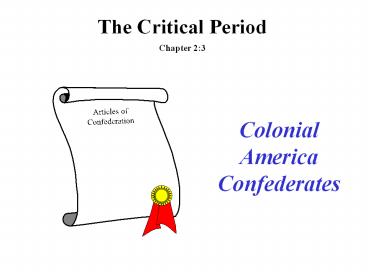The Critical Period - PowerPoint PPT Presentation
1 / 16
Title: The Critical Period
1
The Critical Period Chapter 23
Articles of Confederation
Colonial America Confederates
2
Second Continental Congress appointed a committee
to develop a plan of government for the United
Colonies
John Dickinson was appointed to lead the group
3
Unitary system
- a nations central government does not share
power with local or regional governments - states, counties, cities, and towns
- are divisions of the central government
- administer laws made by the central government
4
Most Americans oppose the English system
of government
- believed the best safeguard for individual
freedom was to divide power among state
governments
5
Articles of Confederation
Articles of Confederation
a moderate plan of government proposed by
Dickinsons committee
Was not ratified by the states until 1781!
6
What is a confederation?
- a loose association of independent states bound
together for a particular purpose
7
Congressional Powers under theArticles of
Confederation
- to make peace and war
- to make treaties and alliances
- to coin money
- to regulate trade with Indians
- to borrow money
- to establish a postal system
8
Articles of Confederation were a success
and
Articles of Confederation were a failure
9
Why?
10
Positive results of the Articles of Confederation
- waged a successful war and negotiated a favorable
peace - developed long-term plans for settling the lands
of the Northwest Territory
11
Negative results of the Articles of Confederation
- Congress lacked the power to tax or regulate
trade - states coined own money
- no executive branch to enforce laws
12
How many states were needed to approve a law
before it was passed?
Nine out of thirteen.
13
Why did the Articles of Confederation not provide
for an executive branch?
14
Because of the fear of centralized power!
15
What kind of problems did this cause?
- made it difficult to reach an agreement on
necessary laws - there was no assurance that a law would be
carried out - compliance varied from state to state depending
on how strongly it felt for/against the law
16
Shays rebellion
- 2,000 debt-ridden farmers rebelled against the
state government of Massachusetts
Were angered by a legislature which raised taxes,
courts which foreclosed on their mortgages, and
an insensitive governor































